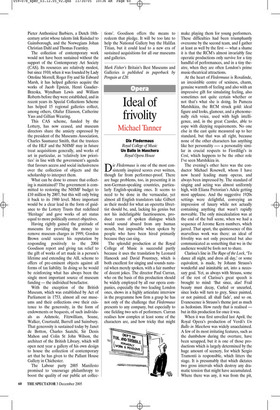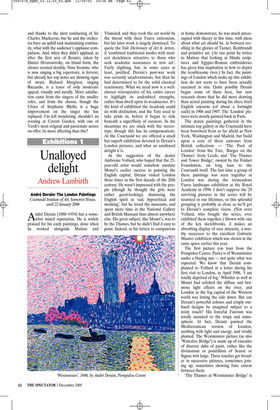Opera
Ideal of frivolity
Michael Tanner
Die Fledermaus Royal College of Music Un Ballo in Maschera Royal Opera House Die Fledermaus is one of the most consistently inspired scores ever written, though far from performer-proof. There are huge problems, too, in presenting it in non-German-speaking countries, particularly English-speaking ones. It seems to need to be done in the vernacular, yet almost all English translators take Gilbert as their model for what an operetta librettist should be, and, lacking his genius but not his indefatigable facetiousness, produce reams of spoken dialogue which would sound absurd from any human mouth, but impossible when spoken by people who have been hired primarily because they can sing.
The splendid production at the Royal College of Music is successful partly because it uses the translation by Leonard Hancock and David Pountney, which is both excellent for singing and sounds natural when merely spoken, with a fair number of decent jokes. The director Paul Curran, who on the basis of this production should be widely employed by all our opera companies, especially the two leading London ones, shows in a highly articulate interview in the programme how firm a grasp he has not only of the challenge that Fledermaus presents to any company, but especially to one fielding two sets of performers. Curran realises how complex at least some of the characters are, and how tricky that might make playing them for young performers. These difficulties had been triumphantly overcome by the second team, and I gather at least as well by the first — what a shame it is that the RCM’s almost invariably fine operatic productions only survive for a tiny handful of performances, and in a tiny theatre, when they are often London’s prime music-theatrical attractions.
At the heart of Fledermaus is Rosalinde, an irresistible centre of sexiness, charm, genuine warmth of feeling and also with an impressive gift for simulating feeling, also sometimes not quite certain whether or not that’s what she is doing. In Pumeza Matshikiza, the RCM struck gold: ideal figure and looks, glamour, and a phenomenally rich voice, used with high intelligence, and, in the great Czardas, able to cope with dizzying requirements. No one else in the cast quite measured up to her standard, but that was all right, because none of the other characters has anything like her personality –— a personality similar in crucial respects to Fiordiligi’s in Così, which happens to be the other role I’ve seen Matshikiza in.
The evening’s other hero was the conductor Michael Rosewell, whom I have now heard leading many operas, and always been impressed by. The standard of singing and acting was almost uniformly high, with Eliana Pretorian’s Adele getting most applause. And the suggestive 1920s settings were delightful, conveying an impression of luxury while not actually containing anything that wasn’t rapidly moveable. The only miscalculation was at the end of the ball scene, when we had a sequence of Jerome Kern numbers, which jarred. That apart, the quintessence of this marvellous work was there: an ideal of frivolity was not only presented but also communicated as something that we in the audience would be fools not to share.
Clarissa’s line in The Rape of the Lock, ‘To dance all night, and dress all day,’ or some equivalent, is made, by Johann Strauss’s wonderful and inimitable art, into a necessary goal. Yet, as always with Strauss, some of the rest of Clarissa’s great speech is brought to mind: ‘But since, alas! Frail beauty must decay, Curled or uncurled, since locks will turn to grey, Since painted, or not painted, all shall fade’, and so on. Evanescence is Strauss’s theme just as much as hedonism. How rarely that is realised but in this production for once it was.
When it was first unveiled last April, the Royal Opera’s production of Verdi’s Un Ballo in Maschera was widely unacclaimed. A few of its most irritating features, such as the dumbshow during the overture, have been scrapped, but it is one of those productions which is largely determined by the huge amount of scenery, for which Sergio Tramonti is responsible, which litters the stage. It is presumably that which dictates two gross intervals which destroy any dramatic tension that might have accumulated. Where there was any, it was from the pit, and thanks to the alert conducting of Sir Charles Mackerras; but he and the orchestra have an uphill task maintaining continuity, what with the audience’s applause compulsion. And, when they didn’t applaud, as after the first aria of Renato, taken by Dmitri Hvorostovsky, on bland form, the silence seemed deathly. Nina Stemme, who is now singing a big repertoire, is fervent, but already her top notes are showing signs of strain. Richard Margison, singing Riccardo, is a tenor of only moderate appeal, visually and aurally. More satisfaction came from the singers of the smaller roles, and from the chorus, though the Ulrica of Stephanie Blythe is a huge improvement on the singer she has replaced. I’m left wondering: shouldn’t an evening at Covent Garden, with one of Verdi’s most original and passionate scores on offer, be more affecting than this?




























































 Previous page
Previous page